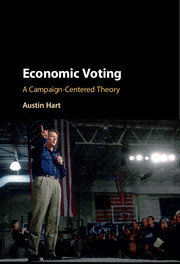Book contents
- Frontmatter
- Dedication
- Contents
- List of Figures
- List of Tables
- Acknowledgments
- 1 The Economic Voting Puzzle
- 2 A Campaign-Centered Theory of Economic Voting
- 3 Can Ads Prime the Economy? How Would We Know? US 1992
- 4 The Impact of a Surge in Economic Messages: Mexico 2006
- 5 The Absent Economic Message: US and Mexico 2000
- 6 The Campaign-Centered Model in Comparative Perspective
- 7 Conclusion
- Appendix
- References
- Index
3 - Can Ads Prime the Economy? How Would We Know? US 1992
Published online by Cambridge University Press: 05 September 2016
- Frontmatter
- Dedication
- Contents
- List of Figures
- List of Tables
- Acknowledgments
- 1 The Economic Voting Puzzle
- 2 A Campaign-Centered Theory of Economic Voting
- 3 Can Ads Prime the Economy? How Would We Know? US 1992
- 4 The Impact of a Surge in Economic Messages: Mexico 2006
- 5 The Absent Economic Message: US and Mexico 2000
- 6 The Campaign-Centered Model in Comparative Perspective
- 7 Conclusion
- Appendix
- References
- Index
Summary
You cannot be president of the United States if you don't have faith. Remember Lincoln, going to his knees in times of trial and the Civil War and all that stuff. You can't be. And we are blessed. So don't feel sorry for – don't cry for me, Argentina. Message: I care.
– President George H.W. Bush at a New Hampshire Primary Speech (1992)1. Change vs. more of the same.
2. The economy, stupid.
3. Don't forget health care.
– Sign posted in the Clinton campaign headquarters by James Carville (1992)
I begin the evaluation of my campaign-centered theory of economic voting with an analysis of the 1992 US presidential election. In part, I choose this case as a starting point because of the near-folkloric status of the above memo, posted on the wall of then-candidate Bill Clinton's campaign headquarters in Little Rock, Arkansas. “The economy, stupid,” is arguably the most famous election-year mantra in recent history. In the last two decades, this saying and its innumerable variations have become common parlance among scholars, reporters, campaigners, popstars, and everyday citizens alike. Although “the economy, stupid” was not used as a slogan as such during the 1992 campaign, it is indicative of the centrality of economic themes in campaign dialogue.
Fascinatingly, this simple slogan has been cited anecdotally in support of each of the competing visions of the economic vote evaluated here. For some, “the economy, stupid” captures the inescapable logic of the conventional structural model. Candidates, for better or worse, are hamstrung by economic circumstances. The saying, in this sense, is a reminder that voters would inevitably come to punish President George H.W. Bush for a stalled recovery from the 1991 recession. Holbrook (1996), for instance, argues that any message Clinton chose would have been as effective as his economic message, and any message Bush chose would have been just as ineffective. Regardless of the message, a growing wave of economic discontent would have swept Clinton to victory.
In stark contrast, others reference “the economy, stupid” as evidence of a candidate's power to prime the economic vote strategically.
- Type
- Chapter
- Information
- Economic VotingA Campaign-Centered Theory, pp. 51 - 74Publisher: Cambridge University PressPrint publication year: 2016
- 1
- Cited by

